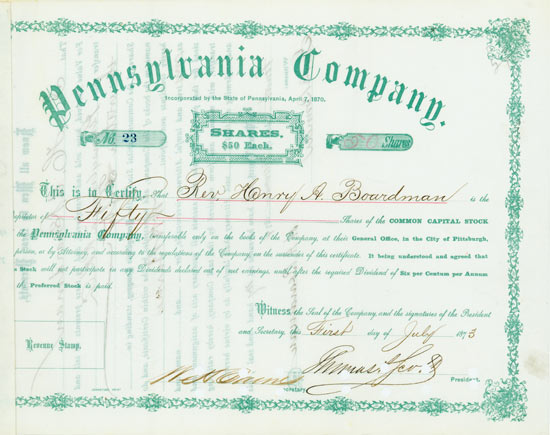Ingelsberg 17 b
D- 85604 Zorneding
Deutschland / Germany
Tel.: +49 (0)8106 - 2461-86
Fax: +49 (0)8106 - 2461-88
E-Mail: auktion@hwph.de
HWPH Historisches Wertpapierhaus AG –
Ваш специалист в области антикварных
ценных бумаг и истории финансов
|
||||
Лот |
1957 | |||
Наименование |
Pennsylvania Company | |||
Место/-а выдачи |
||||
Страна |
USA | |||
Регион |
Amerika | |||
Описание |
State of Pennsylvania, 01.07.1873, 50 Shares á US-$ 50, #23, 21,1 x 27,9 cm, grün, weiß, Knickfalte, links unten etwas Papierverlust, sonst EF, lochentwertet, Original-Signatur von Thomas Scott (von der Entwertung betroffen). | |||
Описание (Английский) |
State of Pennsylvania, 1 July 1873, 50 Shares á US-$ 50, #23, 21.1 x 27.9 cm, green, white, fold, small piece of paper missing at lower left edge, otherwise EF, cancellation holes, original signature Thomas Scott (affected by cancellation). | |||
Сохранность |
EF/VF | |||
 |
||||
История (немецкий) |
Nach diversen Anstellungen begann Thomas Alexander Scott (1823-1881) im Jahr 1850 im Eisenbahngeschäft mitzumischen: Zunächst als Stationsvorsteher in Duncansville, Pennsylvania, stieg er schnell auf der Karriereleiter nach oben. Im Pittsburgher Büro der Pennsylvania Railroad stellte er seinerzeit Andrew Carnegie ein und lehrte ihn viel über Eisenbahnen und Geschäftsmethoden. Was Carnegie daraus machte, ist bekannt. 1859 wurde Scott Vizepräsident und unterstützte den Präsidenten der Gesellschaft, J. Edgar Thompson. Während des Bürgerkriegs wurde er zum Berater von Abraham Lincoln und war für Truppenbewegungen zuständig - natürlich per Eisenbahn. Nach dem Krieg kehrte er zur Pennsylvania Railroad zurück und wurde Präsident der "Western Division". Im Zuge dessen bekam er dieses Amt dann auch bei der Pennsylvania Company - jener 1870 neu gegründeten Tochtergesellschaft, in der dann alle eigenen und geleasten Linien westlich von Pittsburgh konsolidiert und betrieben wurden. Dies war Teil einer aggressiven Kampagne, die Expansion gen Westen voranzutreiben. Von 1871 bis 1872 stand Thomas Scott der Union Pacific Railroad vor, ehe er seinen Anteil dann an Jay Gould verkaufte. Nach Thompsons Tod im Jahr 1874 stand Scott dann an der Spitze der Pennsylvania Railroad. Einen kleinen Karriereknick gab es jedoch: Der lang gehegte Traum von einer transkontinentalen Eisenbahnverbindung, die Scott mittels der Texas and Pacific Railroad verwirklichen wollte, ging nicht in Erfüllung: Fehlende Land- und Grundstücksrechte sowie die nach 1873 einsetzende Wirtschaftskrise ließen das Projekt kurz vor der Fertigstellung scheitern. Auf Grund dieses Misserfolgs, aber auch gesundheitlicher Probleme, zog sich Scott schließlich 1880 aus dem Geschäftsleben zurück. | |||
История (английский) |
Thomas Alexander Scott (1823-1881) entered the Railroad business after several different jobs in 1850: Working first as a Pennsylvania Railroad station agent in Duncansville, Pennsylvania, he moved up the company ladder quickly. At Pennsylvania Railroad's Pittsburgh office he employed Andrew Carnegie and taught him much about railroads and business methods - the beginning of Carnegie’s successful way up. In 1859, Scott became First Vice President in charge of all operations advising the President J. Edgar Thompson. During the Civil War, Scott was in an advisory role to Abraham Lincoln and responsible for troop movements - of course by rail. After the war he returned to the Pennsylvania Railroad as President of the Western Division and, in consequence of that, he became President of the Pennsylvania Company (1870). This subsidiary of the Pennsylvania Railroad was newly created to consolidate and operate all lines owned or leased by the company West of Pittsburgh. It was part of an aggressive campaign to expand the railroad West. From 1871 to 1872, Scott served as President of the Union Pacific Railroad (then he sold his part to Jay Gould), he further became head of the Pennsylvania Railroad after Thompsons' dead in 1874. Unfortunately his big goal of a transcontinental railroad with the Texas and Pacific Railroad couldn't have been realized due to missing land grants and the economic depression following 1873. Scott finally retired from Pennsylvania Railroad due to this failure and health problems in 1880. | |||
Обратите, пожалуйста, внимание на самые лучшие лоты нашего аукциона: |
||||













